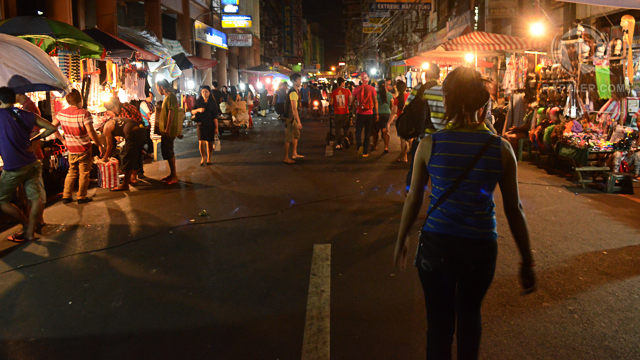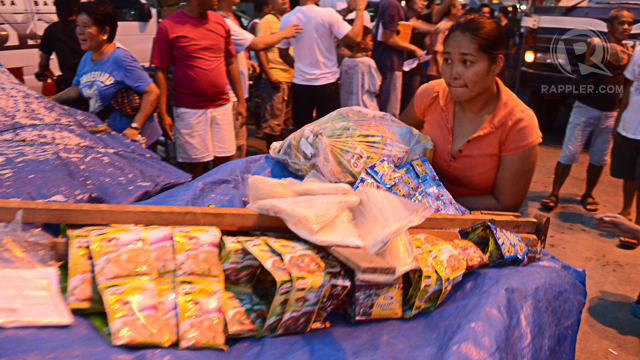SUMMARY
This is AI generated summarization, which may have errors. For context, always refer to the full article.

MANILA, Philippines – Divisoria street vendors are at a loss.
Many of them are supporters, some even die-hard fans, of actor-turned-politician Joseph “Erap” Estrada. But they say the latest policy of their new mayor in Manila has taken away their income.
“Sabi niya, si Erap para sa mahirap. Bakit gano’n? Lahat nililinis nila,” said Divisoria sidewalk vendor Arvy Tiongson, referring to the city’s clearing operations. (He says Erap is for the poor. So why are they doing this, getting us off the streets?)
Starting this week, vendors are not allowed to set up shop along the streets of Manila’s shopping hub during the day.
Instead, the stretch of Juan Luna, as well as parts of Recto and Asuncion streets, are closed to traffic daily starting 6 pm to give way to an “experimental” night market that opened on Friday, August 16.
The vendors who are banned from the streets around Divisoria during the day will be allowed to sell in the evening.
But Tiongson told Rappler the scheme doesn’t work.
Vendors in Divisoria work in shifts – one group sets up shop in the day time, and another takes over come night time. “Maraming nagugutom,” he added, (A lot of us are going hungry.)
From a daily gross income of P500-P1,000, Tiongson said they can barely make ends meet now. Most vendors are also reliant on “5-6” loaning schemes for capital. The slash in revenues since clearing operations began also means vendors don’t have enough capital anymore.

No consultation?
Rhodora Bartolome has been peddling dry goods in Divisoria since she was a teenager. Now middle-aged and pregnant, she called on the new mayor to reconsider his plans.
“Wala naman kaming alam na ibang hanapbuhay kundi magtinda sa bangketa. Sa lapad ng Recto na ito, hindi naman kami magiging sagabal,” she told Rappler. (We don’t have other means of income but to sell on the streets. Recto is wide enough, we won’t block the way.)
Vendors said they weren’t consulted before the scheme was introduced – they only found out this week when clearing operations began.
Vice Mayor Isko Moreno denied this. He said the city government announced plans to clear Manila of sidewalk vendors weeks, even months, prior. He likened vendors’ reactions to how the public reacted to the city bus ban.
“Kumbaga sa babaeng first time nabuntis, nanganganay. ‘Yung public nanganganay pa,” he said. (It’s like a woman who’s pregnant for the first time. The pregnancy is perceived to be more difficult.)
Tiongson and Bartolome also wonder why the city changed its mind about allowing them to sell by the streets. Earlier, local government allowed them to continue selling during the day as long as they did not go beyond one meter from the sidewalk.
Things had to change, said Moreno, because vendors did not follow their agreed restrictions. He also said city hall is open to changes.
“Nauunawaan namin ang katayuan nila (We understand their concerns). But we have to keep a balancing act,” the vice mayor said.

Better or worse?
Moreno admitted there are a lot of things that need to be improved in the new night market. Senior Inspector Gilbert Cruz, precinct commander of station 11, told Rappler the city government is still in the process of taking record of all vendors in the area.
Later on, the list will be used to cluster vendors according to the goods they sell. “I don’t think the chaos will last. We’re always willing to accept challenges, problems,” Moreno added.
Locals also wonder if city hall factored in the crime rate in the area. Petty criminals – snatchers, holduppers – multiply at night, locals said. The stretch of the night market is covered by two police stations. One of them, said one police officer, only has 10 officers on duty at a time.
Vendors also work around city government’s clearing operations easily. Many stalls now have wheels on them to make it easier for them to run when operatives come to shoo them away. “Sanay na rin kami diyan,” said Bartolome. (We’re used to it.)
As with Manila’s other new policies and programs, modifications can be made to the “experimental” night market any time. Moreno said vendors are “entitled to their grievances…but what matters most is the betterment of the city.”
“Gusto namin sumubok lagi, sugalan. We take the risk,” said Moreno. (We always want to try new things, to take chances.) –Rappler.com
Add a comment
How does this make you feel?
There are no comments yet. Add your comment to start the conversation.